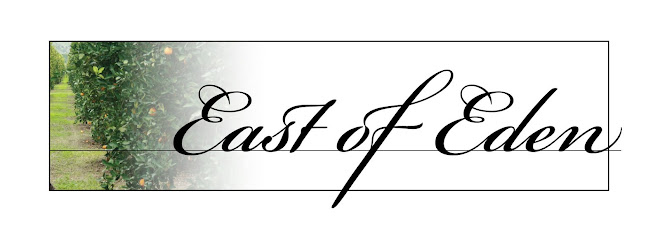It has been suggested that I blog about the reason for my title, and so I shall.
East of Eden is, first and foremost-easily-recognizably my favorite novel. If you would like my reasons why, you'll have to ask (set aside some time).
I also chose it for a far more complicated reason. In my worldview, which is specific to my life experiences and point of view, East of Eden symbolizes my position in life right now.
My point of view was forever changed in one semester during which I took an entire class on Paradise Lost by John Milton, in its original language. I deciphered it, with increasing speed as I went along (the initial pages were incredibly laborious, and I had been known to spend over an hour on one page). The masterpiece is the story of the fall of man, but it is told in a way that is incredibly groundbreaking to have been written when it was (1667 to be exact). John Milton wrote the story beginning with the angels being cast from Heaven and falling into Hell, and his perspective, as all of ours are, was deeply tinged with his own life experiences. Having recently been jailed for his association with Oliver Cromwell, Milton wrote from the confines of a prison, while his own prison walls began to close in on him, as he was becoming blind. In addition, his disappointment at having backed a regime or movement that was overthrown and dismissed colors the travails of the outcast angels fighting to make a place for themselves in a Heaven that they thought was unfair. Satan is the hero in this epic poem, and Milton associates with him more than he does any other character. Milton's view is that free will and the will of God at times contradict one another, and conflicts arise.
Reading this poem is no less than a profoundly impacting life experience. I cried, I laughed, I felt lost and I experienced triumph unlike any I'd every known. It has colored my experiences ever since, and enhanced my reading of East of Eden as well.
The experience of living East of Eden, in my mind, is similar to the experience that Milton's Satan had living right outside of the Garden of Eden, looking in on Paradise and having not a single hope of experiencing happiness there. While that may some sad, Eden was not to last, and the happiness experienced there only soiled Adam and Eve's perception of "real" life, a life in which they now have free will, but heartache and pain. Thus, the dichotomy between free will and paradise. You cannot have both. You must choose.
I could argue that Satan was better off outside of the garden because, aside from his longing for something he would never possess (at least not in happiness) he could see beauty, and he knew it. In our post-lapsarian world, we will never experience Paradise on Earth, but understanding what it could be and knowing that it exists allows us to always strive for more, better, fulfillment and experiences. It is hope, while at the same time, being realistic to the knowledge that what you hope for will never be fully attained. This may seem to be a contradiction, but if I can explain it correctly, it is precisely the intersect of optimism and pragmatism.
What you really strive for is not perfection, or perfect beauty, or perfect happiness, because there is no such thing. You strive to be closer, and to live in the glow of such things.
I think that is we could all be content to live in the glow of perfection, we may breathe easier. On the other hand, I describe myself as on the brink of perfection because there are certainly times when I am the outsider, staring in longingly and wanting paradise so badly. I need to learn to be content in the glow, to be content at my place in the world, East of Eden.
How To Build Unshakable Confidence
2 weeks ago



very well written! it brings up a lot of questions, but more obviously, presents the real struggle (and longing) we have to interact with divinity. the story of how satan is portrayed also reminds me of "screwtape letters" by c.s. lewis.
ReplyDeletegood stuff my friend.